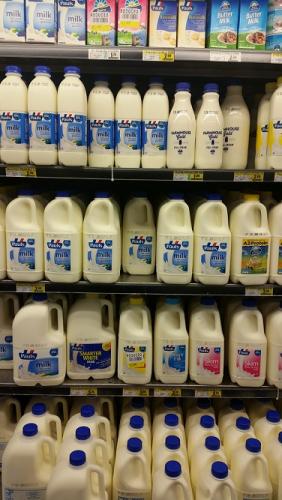Dairy farmers are hurting and so are those who buy milk
The current dairy industry crisis has exposed a longstanding dilemma: Australians on low incomes often have too little money to buy the higher cost food items the fair food advocates would prefer them to buy. Russ Grayson says instead of academic discourse we need to tackle food security and affordable access to good food for all.
OUR CURRENT milk wars are creating problems for dairy farmers who suddenly find their livelihoods threatened by milk companies paying drastically reduced prices for their milk and for people struggling on low incomes, though for different reasons.
The crisis in the dairy industry has stimulated incidents that bring to the forefront issues around equitable access to food in our country, something that goes by the name of food security — affordable access to a supply of nutritious food, year round, capable of supporting an active life. This has long been a low-lying issue but it is highlighted by the actions of some of those supporting the dairy farmers in our current dairy industry crisis.
One of the ways it is highlighted comes to us in reports that some supporters of the besieged dairy farmers are bullying people who buy the supermarkets’ cheap brand name milk that has been linked to low milk prices paid to farmers. This might be seen as showing solidarity with the farmers but it also shows ignorance of how some people struggle to meet their life needs, like food.
They say they cannot afford branded milk products. 
“We understand that our farmers need supporting but no one needs to be called names and abused because we can’t afford brand name milk. We just appreciate having some milk”, said one shopper reported.
“Please don’t judge the person standing beside you at the milk fridge. It’s not always a case of having a few extra $$. We simply don’t have it. Our life is hard enough at the moment without having to deal with people like that. All I’m asking is please don’t judge those who can’t afford it”, said another.
“I have to admit I did look twice at someone buying the cheapie… holding back my opinion. But most of us have been there — buy what you can afford. I won’t say anything”, another said.
The quotes come from an article on the Kidspot website. They are indicative of comments I have heard from people who advocate food sovereignty and who say that food is too cheap and that we should all “pay the real cost of food”.
Much of this abuse is reported to have taken place at milk refrigerators in supermarkets. Staff, too, have been abused and the supermarkets accused of withholding supply of brand name milk in favour of their own house brands. The accusation was all over social media, forcing supermarket management to deny the allegations. Getting people to believe them is going to take a lot of work, given recent bad corporate behaviour by the supermarket industry and its being fined for deceptive practices.
OPPOSING INTERESTS
The bigger issue this is a subset of is food affordability. The dilemma for fair food advocates is that people on government benefits, single parents, those on low incomes and pensioners often have too little money to buy the higher cost food items the fair food advocates would prefer them to buy. Supermarkets are their source of affordable food because of the cheaper food lines they sell. Those same lines, however, are sometimes imported foods sold below costs at which Australian farmers can compete.
This inadvertently pits the interests of low income people against fair food advocates and against the interests of some, especially smaller, Australian farmers. This is how one respondent put it in the linked article:
“No one is denying that the famers are doing it seriously tough but so are many other families out there who don’t run dairy farms.
“For some people it’s just the difference of a dollar or two while for others it could mean the difference of being able to buy milk or not.”
The comment resonates with others made in the past about farmers getting all the sympathy when their livelihoods are threatened. What about people in urban areas or others in rural towns whose employment is ended and who find difficulty finding alternative work, such as older workers, some have asked? Why should farmers get all the sympathy? Other people’s livelihoods are ruined by economic change too.
Another comment came in the form of a question. Do those low income people who find higher milk prices difficult to afford go out and buy bottles of Coke, which is not really a food at all, someone asked.
That’s a question about what people see as food and of the advertising industry’s role in that. It is an assumption that this is what happens and would not be universal across the low income demographic, of course. It also assumes that strangers can dictate to low income people what their diet should be.
THE RISKS OF INDIVIDUALISING ISSUES
I believe that most fair food advocates would be repulsed by some of their number bullying people who cannot afford higher-priced milk. Perhaps it demonstrates how those people live in a well-paid reality distortion zone where the cost of basic human needs is easily met.
The reported incidents highlight how individualising an issue that is systemic in nature alienates people. Environmentalists did the same thing when they inflicted guilt trips on people who didn’t behave as they thought they should. It didn’t work then, though it did alienate people from environmentalism, and it won’t work now with cheap milk. All it will do is alienate Australia’s substantial and growing low income demographic from fair food advocates.
A LAND OF DUAL FOOD SYSTEMS
The reports of bullying nicely sum up the dilemma the dairy industry crisis has exacerbated and it accurately highlights that we have two food systems in Australia: that of low income people who rely on supermarket prices to feed themselves and their families, and that of people with salaries and income that enables them to buy Australian and to buy foods that offer a fair return to farmers.
Unfortunately, fair food advocates all-too-seldom address the issue of food affordability and food security. It is time they did.
We can do better. Important that is it, going on about food sovereignty is simply too esoteric for a great many people. Yes, it is true what food sovereignty advocates say, that food security is too narrow an issue on which to build a fair food future in which Australians control their own food systems, farmers get a good return on their labour and eaters get good, affordable food.
This issue shows that food security and affordability are real, everyday concerns for a great many people. Rather than engage in academic discourse around issues of sovereignty, perhaps fair food advocates with some tactical know-how could devise a program around food sovereignty that starts with food security and the real issues around people getting affordable access to good food.
Read the article at Kidspot here.
Russ Grayson is an online and photojournalist reporting on food systems, community initiatives and technology and society. A media contact for the Australian City Farm & Community Gardens Network, Russ has worked in international development in the South West Pacific, local government and urban agriculture.















